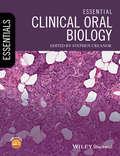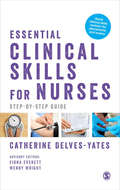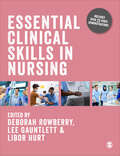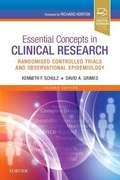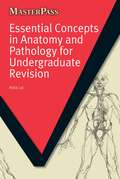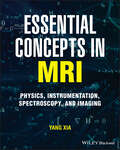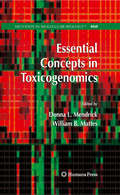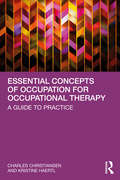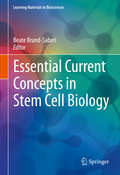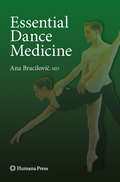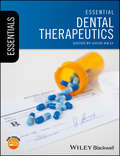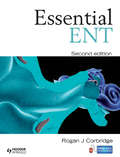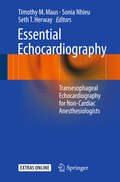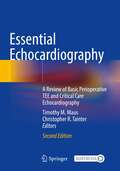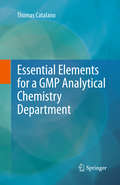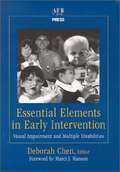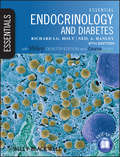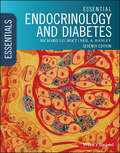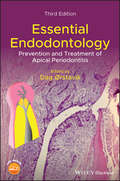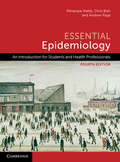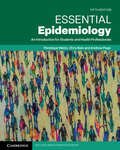- Table View
- List View
Essential Clinical Oral Biology
by Stephen CreanorEssential Clinical Oral Biology is an accessible guide to oral biology, introducing the scientific knowledge necessary to succeed in clinical practice. Student-friendly layout with clinical photographs throughout Each chapter has clearly defined key topics and learning objectives Covers the essentials: what you need to know and why Companion website featuring interactive MCQs, teaching presentations and downloadable images
Essential Clinical Skills for Nurses: Step by Step
by Catherine Delves-YatesThis little book is an ideal clinical skills reference for nursing students and junior health care practitioners. Its easy to navigate design and step-by-step approach allows for information to be accessed quickly to help students review skills while on placement and prepare for their OSCE exams. - Essential equipment tick lists helps ensure students know what they need to perform clinical skills. - Patient considerations promote strategies to provide the best possible care. - All fields of nursing are covered with tips throughout to help students support every patient group. - Introduces different approaches to performing clinical skills in community and acute settings to help students and new practitioners feel confident performing the skill in any situation.
Essential Clinical Skills for Nurses: Step by Step
by Catherine Delves-YatesThis little book is an ideal clinical skills reference for nursing students and junior health care practitioners. Its easy to navigate design and step-by-step approach allows for information to be accessed quickly to help students review skills while on placement and prepare for their OSCE exams. - Essential equipment tick lists helps ensure students know what they need to perform clinical skills. - Patient considerations promote strategies to provide the best possible care. - All fields of nursing are covered with tips throughout to help students support every patient group. - Introduces different approaches to performing clinical skills in community and acute settings to help students and new practitioners feel confident performing the skill in any situation.
Essential Clinical Skills in Nursing
by Deborah Rowberry Lee Gauntlett Libor HurtYour complete solution for modern clinical skills education Accompanied by over 25 videos and written by an experienced team of nursing educators and practitioners, this innovative textbook will support your clinical skills training across all years of your degree. Taking a holistic and inclusive approach, the book presents both the theory, rationale and ‘how to’ of each procedure, as well as crucial interconnected skills such as communication, clinical reasoning and person-centred practice. Written in clear, straightforward language and mapped to the NMC Future Nurse Standards, the book delivers a complete solution for mastering the essential clinical skills you need as a student and registered nurse. How will the book support my learning? · Offers access to more than 25 videos alongside the text, demonstrating clinical skills in practice, from oxygen administration to venepuncture, cannulation and more · Structured around the 2018 NMC standards procedures annexe providing full curriculum coverage · Draws on over 30 case study scenarios and ‘voices’ from real pre-registration nursing students that bring clinical skills to life · Includes over 60 activities, key term definitions and other features to hone your understanding through self-testing, reflection and critical thinking · Relevant to students across all four fields of nursing
Essential Clinical Skills in Nursing
by Deborah Rowberry Lee Gauntlett Libor HurtYour complete solution for modern clinical skills education Accompanied by over 25 videos and written by an experienced team of nursing educators and practitioners, this innovative textbook will support your clinical skills training across all years of your degree. Taking a holistic and inclusive approach, the book presents both the theory, rationale and ‘how to’ of each procedure, as well as crucial interconnected skills such as communication, clinical reasoning and person-centred practice. Written in clear, straightforward language and mapped to the NMC Future Nurse Standards, the book delivers a complete solution for mastering the essential clinical skills you need as a student and registered nurse. How will the book support my learning? · Offers access to more than 25 videos alongside the text, demonstrating clinical skills in practice, from oxygen administration to venepuncture, cannulation and more · Structured around the 2018 NMC standards procedures annexe providing full curriculum coverage · Draws on over 30 case study scenarios and ‘voices’ from real pre-registration nursing students that bring clinical skills to life · Includes over 60 activities, key term definitions and other features to hone your understanding through self-testing, reflection and critical thinking · Relevant to students across all four fields of nursing
Essential Concepts In Clinical Research: Randomised Controlled Trials And Observational Epidemiology
by David A. Grimes Kenneth SchulzThis practical guide speaks to two audiences: those who read and those who conduct research. Clinicians are medical detectives by training. For each patient, they assemble clinical clues to establish causes of signs and symptoms. The task involves both clinical acumen and knowledge of medical research. This book helps guide clinicians through this detective work, by enabling them to make sense of research and to review medical literature critically. It will also be invaluable to researchers who conduct clinical research, particularly randomized controlled trials. <p><p> Building on previously published, peer-reviewed articles from The Lancet, this handbook is essential for busy clinicians and active researchers interested in research methods. <p> Written by leaders in the field of clinical research who have published extensively with authorship of hundreds of articles in medical journals. The authorship includes one of the three authors of the CONSORT guidelines for the reporting of randomized controlled trials. <p> The book presents the essential concepts to a wide array of topics including randomized control trials, descriptive studies, cohort studies, case-control studies, bias, and screening tests. <p> The book utilises a readable and humorous prose style, lightening what can be a difficult area for clinical readers. <p> Derived from decades of teaching clinical research in seminar settings the book will empower clinicians to make sense of, and critically appraise, current medical research and will enable researchers to enrich the quality of their work. For this Second Edition, the authors have revised and updated the original 16 chapters and added six new chapters. For busy clinicians and active researchers interested in research methods, this book provides helpful tools to derive satisfaction - indeed, fun - from clinical science.
Essential Concepts in Anatomy and Pathology for Undergraduate Revision (MasterPass)
by Aida LaiAnatomy and pathology are key areas in medical training, but the amount medical students have to learn within them can seem overwhelming. This book helps students gain a firm grasp of the facts they must know before they enter their clinical years. It encompasses the core basics of the major organ systems in the body and presents them in a memorable, easy-to-read form. The book covers the background and knowledge that are clinically relevant to, and commonly encountered in, end-of-semester exams and provides a solid preparation for clinical years. It is an excellent resource for all medical students wishing to gain and retain anatomy and pathology knowledge in a time-effective manner.
Essential Concepts in MRI: Physics, Instrumentation, Spectroscopy and Imaging
by Yang XiaESSENTIAL CONCEPTS IN MRI A concise and complete introductory treatment of NMR and MRI Essential Concepts in MRI delivers the first comprehensive look at magnetic resonance imaging with a practical focus on nuclear magnetic resonance spectroscopy applications. The book includes the essential components of MRI and NMR and is written for anyone new to the field of MRI who seeks to gain a complete understanding of all four essential components of MRI: physics theory, instrumentation, spectroscopy, and imaging. Highly visual and including numerous full color figures that provide crucial graphical descriptions of key concepts discussed in the book, Essential Concepts in MRI includes discussions of quantitative and creative MRI, as well as spatial mapping in MRI and the effects of the field gradient and k-space imaging. The book also covers: A thorough introduction to essential concepts in nuclear magnetic resonance, including classical descriptions of NMR and quantum mechanical descriptions of NMR Comprehensive explorations of essential concepts in NMR instrumentation, including magnets, radio-frequency coils, transmitters, and receivers Practical discussions of essential concepts in NMR spectroscopy, including simple 1D spectroscopy, double resonance, and dipolar interactions in two-spin systems In-depth examinations of essential concepts in MRI, including the design of MRI pulse sequences and the elements of MRI instrumentation, with a special focus on quantitative MRI Essential Concepts in MRI is a must-read reference for upper-level undergraduate and postgraduate students in the physical and medical sciences, especially radiology, MRI, and imaging courses. It is also essential for students and researchers in the biomedical sciences and engineering.
Essential Concepts in Toxicogenomics
by Donna L. Mendrick William B. MattesThe field of toxicogenomics has been growing quickly, yet with rapid growth comes the need to periodically reflect on the nature of the field. Essential Concepts in Toxicogenomics collects reviews, opinion pieces and case studies from the leading experts in this dynamic field with a focus on its application to pharmaceuticals. Topics covered include issues that affect the quality of toxicogenomics experiments, statistical approaches to their data analysis, the use of such data to build toxicogenomic models, and the utilization of genomics to identify biomarkers within the preclinical and clinical arenas. Although not in the standard Methods in Molecular BiologyTM series format, this volume retains the practicality and usefulness of the highly successful series. Informative and cutting-edge, Essential Concepts in Toxicogenomics is an ideal resource for pharmaceutical companies, chemical manufacturers, toxicologists, and all who must keep up-to-date on progress in this vital and important field.
Essential Concepts of Occupation for Occupational Therapy: A Guide to Practice
by Charles Christiansen Kristine HaertlEssential Concepts of Occupation for Occupational Therapy is an accessible introduction to vital concepts in occupational science for the occupational therapy practitioner or student. It invites therapists to view and understand their clients differently—by using an “occupational lens” to focus on the lives of their clients as everyday doers. It addresses the key questions at the heart of understanding humans as occupational beings: What do people typically do? And, where, when, how, why, and with whom do they do it? These questions organize the key concepts from occupational science that form the first chapters of this book, enabling therapists to better understand their clients—and enabling their clients to better understand the importance of occupation to their well-being. Additional chapters clearly describe how therapists can use occupation-based models to apply an expanded view of occupation and make evaluation and intervention more relevant and beneficial to their clients. A final chapter examines trends and lifestyle changes occurring in the 21st century to anticipate how these might impact future practice. Through use of engaging and thoughtful cases that illustrate many of the concepts, this guide will help practitioners clearly understand their clients as doers, while also providing enhanced ways for therapist to confidently apply these concepts in practice.
Essential Current Concepts in Stem Cell Biology (Learning Materials in Biosciences)
by Beate Brand-SaberiThis textbook describes the biology of different adult stem cell types and outlines the current level of knowledge in the field. It clearly explains the basics of hematopoietic, mesenchymal and cord blood stem cells and also covers induced pluripotent stem cells. Further, it includes a chapter on ethical aspects of human stem cell research, which promotes critical thinking and responsible handling of the material.Based on the international masters program Molecular and Developmental Stem Cell Biology taught at Ruhr-University Bochum and Tongji University Shanghai, the book is a valuable source for postdocs and researchers working with stems cells and also offers essential insights for physicians and dentists wishing to expand their knowledge.This textbook is a valuable complement to Concepts and Applications of Stem Cell Biology, also published in the Learning Materials in Biosciences textbook series.
Essential Dance Medicine
by Ana BracilovicGroundbreaking and long overdue, Essential Dance Medicine is a unique text designed to help medical professionals learn the presentations, differential diagnoses and available treatment options for common dance injuries. As different types of dance have evolved, so have their related injuries. This novel text explains the underlying principles associated with correct ballet, modern and ethnic dance movements to better understand the pathophysiology and mechanism of action for the injuries described. It provides further insight by elucidating common errors and compensations dancers often make in an effort to achieve correct positioning and technique. Describing different types of dance injuries according to body region, each chapter is organized by case reports that depict a typical patient, followed by the epidemiology and pathophysiology associated with the dancer's injury. The history, physical examination findings, imaging and diagnostic evaluation for each condition are discussed. Non-operative and surgical treatment options are described according to chronicity and stage of severity of the injury. To provide evidence behind the algorithms of treatment and to highlight applicable research, relevant studies are cited as often as possible. Classic texts are also referenced to provide more in-depth information. Certain to become a gold standard in the field, Essential Dance Medicine is an important new text that provides medical professionals with the necessary tools to treat amateur and professional dancers and help them prolong their dance careers.
Essential Dental Therapeutics
by David WrayEssential Dental Therapeutics is a practical guide to drugs and their effects on dental care. Covering both medical and dental prescribing, all major categories of prescription drugs, their possible side effects, and potential drug interactions are discussed. The medical section is succinct and easily understandable, providing busy dentists with the information they need about medical conditions and the drugs used to treat them. The dental section offers practical, straightforward information that is relevant to everyday dental prescribing. All clinical contributing authors are medically and dentally trained, and both strands are fully integrated throughout the text. Readers can test their knowledge by using the key topics and learning objectives at the start of each chapter, and by accessing the companion website featuring self-assessment questions. Essential Dental Therapeutics is a practical reference for dental students and practitioners, ensuring they are safe and informed in everyday practice.
Essential ENT (Electronic Resource Ser.)
by Rogan CorbridgeThis innovative and accessible guide to ear, nose and throat medicine delivers everything you need to know to develop a thorough grounding in the subject, acting as an essential course companion and an ideal revision aid.Written in a lively and accessible manner reflecting the author's popular lecturing style, the content has been carefully matched
Essential Echocardiography
by Timothy M. Maus Sonia Nhieu Seth T. HerwayCovering both transesophageal echocardiography (TEE) and transthoracic echocardiography (TTE), this book fills the need of accessible information for the practitioner seeking a basic level of familiarity with TEE and TTE in the perioperative management of the surgical patient. This book is a practical guide on echocardiography written for non-cardiac anesthesiologists and critical care physicians who wish to become familiar with the use of transesophageal echocardiography (TEE) and transthoracic echocardiography (TTE) as well as a resource for anesthesiologists studying for the Basic PTE examination. Essential Echocardiology also features extensive figures and more than 100 echocardiography videos.
Essential Echocardiography: A Review of Basic Perioperative TEE and Critical Care Echocardiography
by Timothy M. Maus Christopher R. TainterBuilding on the success of the previous edition, this review book includes all of the original content plus several new chapters dedicated to the education and implementation of transthoracic echocardiography and point-of-care ultrasonography. Chapters feature board review-style questions and answers to assist readers with board exam preparation. This book also includes the most up-to-date echocardiography content and practice guidelines. This book fills an educational gap in the perioperative and critical care echocardiography landscape. It addresses essential perioperative and critical care echocardiography topics in an accessible manner for those who provide acute care and resuscitation in any environment, including the operating room, intensive care unit, and the emergency department. Essential Echocardiography, 2nd edition, is expertly written for the practitioner with limited knowledge of echocardiography preparing for either the Examination of Special Competence in Basic Perioperative TEE (Basic PTEeXAM) or the Examination of Special Competence in Critical Care Echocardiography (CCEeXAM).
Essential Elements for a GMP Analytical Chemistry Department
by Thomas CatalanoEssential Elements for a GMP Analytical Chemistry Department is a systematic approach to understanding the essential elements required for a successful GMP Analytical Department to function as an efficient and effective organization. It describes in detail a department structure which allows for the necessary processes to become available to all its personnel in a way where there is a free flow of information and interaction. The environment and culture created by this approach encourages and rewards the sharing of ideas, skills, and abilities among department personnel. The essential elements such as , SOP's, regulatory guidance's/guidelines, project teams, technical and department processes, personnel motivation, outsourcing, and hiring the best is among the many topics that are discussed in detail and how they can be implemented to build an efficient and effective Analytical Department. This book will serve as a valuable asset to the many companies required to perform GMP analytical method development, validation, analyses etc including start-up, virtual, and generic pharmaceutical companies.
Essential Elements in Early Intervention: Visual Impairment and Multiple Disabilities
by Deborah ChenThe latest comprehensive resource from an outstanding early childhood specialist, this guide provides a range of information on effective early intervention with young children who are visually impaired and have other disabilities. Containing valuable explanations of functional and clinical vision and hearing assessments, descriptions of evaluative and educational techniques, and useful suggestions on working with families and with professional teams, Essential Elements in Early Intervention provides practitioners with expert insights for successful interventive efforts.
Essential Endocrinology and Diabetes
by Neil A. Hanley Richard I. HoltBeautifully presented, and now in full colour, the sixth edition of Essential Endocrinology and Diabetes is fully up-to-date with the latest knowledge and concepts on the workings of the endocrine system. It explains the key principles of endocrine physiology in an easy reading style popular with students, clinicians and scientists. The invaluable background on basic science and investigation, including new molecular techniques, provides the foundation for detailed discussion of the diagnosis and management of clinical endocrine disorders and diabetes.The teaching style and presentation has been strengthened throughout, and includes learning objectives and "recap" links at the beginning of each chapter that remind the reader of key findings and principles, while cross-referencing makes it easy to locate related information quickly and efficiently. There are also more case studies, with detailed answers applying theory to practice.Essential Endocrinology and Diabetes is the perfect resource for a course on endocrinology and diabetes, as part of USMLE teaching, and an on-going companion during postgraduate clinical and scientific study. It is accompanied by a FREE enhanced Wiley Desktop Edition - the interactive, digital version of the book - featuring downloadable text and images, highlighting and note taking facilities, book-marking, cross-referencing, in-text searching, and linking to references and glossary terms.
Essential Endocrinology and Diabetes (Essentials #29)
by Neil A. Hanley Richard I. HoltEssential Endocrinology and Diabetes provides the accurate and up-to-date knowledge required for treating all areas of endocrinology and diabetes, covering the latest research, clinical guidelines, investigational methods, and therapies. This classic text explains the vital aspects of endocrine physiology in a succinct and easy-to-use format, with full-colour illustrations, clinical images, and case studies to assist readers in applying theory to practice. The text covers the principles of endocrinology, clinical endocrinology, and clinical diabetes and obesity, and has been revised throughout to present the most recent developments in the field. The seventh edition includes new and updated material on the latest molecular techniques, approaches to clinical investigation and diagnostics, next generation sequencing technology, and positron emission tomography (PET). The treatment of type 1 diabetes and type 2 diabetes has been updated with clinical algorithms and reflects significant advances such as incretin-based therapies, SGLT2 inhibitors, the development of better insulins, and technologies that support self-management. Provides students and practitioners with comprehensive and authoritative information on all major aspects of endocrine physiology Covers diagnosis, management, and complications of clinical disorders such as endocrine neoplasia, and type 1 diabetes and type 2 diabetes Explains the core principle of feedback regulation, which is vital for the correct interpretation of many clinical tests Features case histories, learning objectives, ‘recap’ links to chapter content, cross-referencing guides, key information boxes, and chapter summaries Essential Endocrinology and Diabetes, Seventh Edition is the ideal textbook for medical and biomedical students, junior doctors, and clinicians looking to refresh their knowledge of endocrine science.
Essential Endodontology: Prevention and Treatment of Apical Periodontitis
by Dag ØrstavikThe authoritative reference that continues to present a systematic analysis of the scientific basis of endodontology The third edition of Essential Endodontology: Prevention and Treatment of Apical Periodontitis has been revised and updated to include the most recent developments in the field, maintaining its position as the major scientific treatise of apical periodontitis. Making an often-complex subject more digestible, the book explores the scientific basis of endodontology, adopting a systematic analysis of the available clinical and laboratory evidence. Promoting apical periodontitis as a disease entity, the comprehensive third edition focuses on its biology and clinical features, enabling the reader to have a better understanding of its diagnosis, prevention and treatment. In addition to thorough updates and full colour illustrations throughout, a new chapter on regenerative endodontics has been added to this edition. Written with a focus on the scientific basis of endodontology Includes a new chapter on regenerative endodontics Presents the most current information and major developments in this fast-moving field Provides helpful learning outcomes in each chapter Contains full colour illustrations, enriching the text Features contributions from a noted panel of international experts, including new contributors from across the globe Regarded as a vital companion to the pursuit of excellence in postgraduate and specialist education, Essential Endodontology is an indispensable and accessible resource for practicing endodontists, postgraduate students of endodontology and those seeking professional certification in endodontology.
Essential Epidemiology
by Penny Webb Chris Bain Andrew PageThe new edition of this popular textbook remains a clear and practical introduction to epidemiology for students in all areas of health. By emphasising the role of epidemiology across a broad range of health monitoring and research, it gives students an understanding of the fundamental principles common to all areas of epidemiology. It also integrates the study of infectious and chronic diseases as well as public health and clinical epidemiology. Avoiding complex mathematics, it steps through the methods and potential problems underlying health data and reports, while maintaining a balance of rigour and clarity. The nuts-and-bolts of epidemiology are embedded in the wider international health perspective through recent and classical examples across different areas of health to engage students from a range of backgrounds. Concepts are illustrated with charts and graphs, and end-of-chapter questions test understanding (with answers provided). Online resources include further exercises, slides for teaching and useful weblinks.
Essential Epidemiology
by Penny Webb Chris BainThe new edition of this popular textbook remains a clear and practical introduction to epidemiology for students in all areas of health. By emphasising the role of epidemiology across a broad range of health monitoring and research, it gives students an understanding of the fundamental principles common to all areas of epidemiology. It also integrates the study of infectious and chronic diseases as well as public health and clinical epidemiology. Avoiding complex mathematics, it steps through the methods and potential problems underlying health data and reports, while maintaining a balance of rigour and clarity. The nuts-and-bolts of epidemiology are embedded in the wider international health perspective through recent and classical examples across different areas of health to engage students from a range of backgrounds. Concepts are illustrated with charts and graphs, and end-of-chapter questions test understanding (with answers provided). Online resources include further exercises, slides for teaching and useful weblinks.
Essential Epidemiology: An Introduction For Students And Health Professionals (Essential Medical Texts For Students And Trainees Series)
by Chris Bain Andrew Page Penelope WebbNow in its fourth edition, Essential Epidemiology is an engaging and accessible introduction to the foundations of epidemiology. It addresses the study of infectious and chronic diseases, public health and clinical epidemiology, and the role of epidemiology in a range of health monitoring and research activities. Contemporary, historical and hypothetical examples enable students to engage with content, while mathematics is kept understandable with complex mathematics housed in optional material so the book remains accessible. With over ninety questions and answers to work through, this book is an essential resource for students, practitioners and anyone else who needs to interpret health data in their studies or work. Epidemiology's most important goal is to bring rigour to the collection, analysis and interpretation of health data to improve health on a global scale; Essential Epidemiology provides readers the tools to achieve that goal.
Essential Epidemiology: An Introduction for Students and Health Professionals
by Penelope Webb Chris Bain Andrew PageEpidemiology is fundamental to public health, providing the tools required to detect and quantify health problems and identify and evaluate solutions. Essential Epidemiology is a clear, engaging and methodological introduction to the subject. Now in its fifth edition, the text has been thoroughly updated. Its trademark clear and consistent pedagogical structure makes challenging topics accessible, while the local and international examples, including from the COVID-19 pandemic, encourage students to apply theory to real-world cases. Statistical analysis is explained simply, with more challenging concepts presented in optional advanced boxes. Each chapter includes information boxes, margin notes highlighting supplementary facts and question prompts to enhance learners' understanding. The end-of-chapter questions and accompanying guided solutions promote the consolidation of knowledge. Written by leading Australian academics and researchers, Essential Epidemiology remains a fundamental resource and reference text for students and public health practitioners alike.
